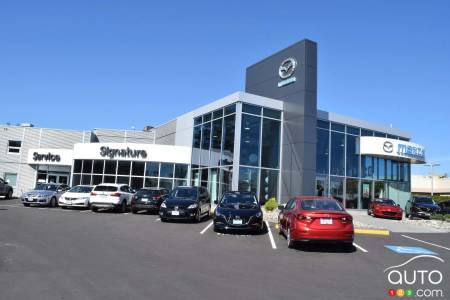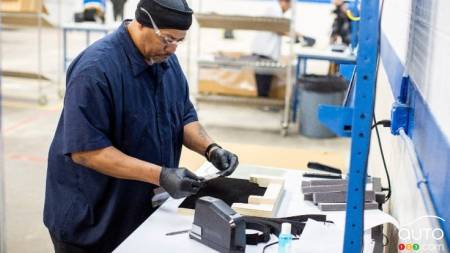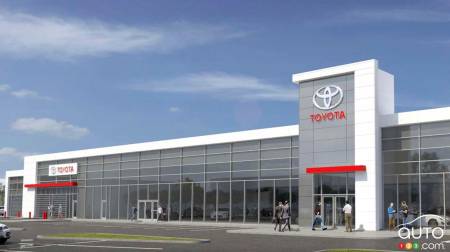The coronavirus pandemic is having severe repercussions on all aspects of our daily lives, and the automotive industry is as deeply affected as any sector during the current global crisis. As we’ve reported on a daily basis, automakers have had to slow down or stop production in most of their assembly plants around the world, including here in Canada, where some very popular models are assembled.
At the retail level, dealer networks are also affected by the freezing of the economy, even as many of them continue to offer basic services to customers, and even deliver new vehicles to buyers who need a vehicle, coronavirus or no coronavirus.
To get a clearer picture of what the industry is experiencing and planning, and how it is looking to take care of its customers, we surveyed the major manufacturers in Canada, who were kind enough to fill us in on their current policies and their plans for the future, which have of course been completely upended by the pandemic and the accompanying global economic shutdown.
Auto123 launches Shopicar! All new makes and models and all current promotions.

Hyundai dealer in St. John’s. Newfoundland
1. Measures to help customers
First, the crucial question for many Canadian motorists is, what do manufacturers have in place to help their customers?
Most if not all manufacturers are offering existing customers the possibility of deferring payments on financing or leasing, or to defer the first payments on the purchase of a new vehicle for a period of three months or even up to six months. Here’s more specific information for each manufacturer, and how you can contact them.
Audi – The German manufacturer advises its customers to contact Audi Finance directly to agree on a payment deferral. Customer service agents can be reached at [email protected] or by phone at 1-888-412-2834.
BMW – BMW Canada’s Finance Department can be reached via email at [email protected] or by phone at 1-800-3000-BMW or 1-800-300-0269.

BMW dealer in Sudbury, Ontario
FCA (Alfa Romeo, Chrysler, Dodge, Fiat, Jeep, Ram) – Well-established in Canada, notably with its three assembly plants, the FCA group also offers its customers the option of deferring payment for their vehicle for up to 120 days following purchase. In addition, the website of each automotive division of the Italian-American manufacturer has been redesigned to make online shopping easier, notably with the insertion of new tools for getting credit approval or even real-time chatting with an advisor. For existing customers, FCA recommends contacting lenders to plan for deferred payments.
Ford / Lincoln – For Ford and Lincoln products, the Dearborn-based manufacturer recommends contacting Ford Credit Canada at 1-877-636-7346, the company’s financial division best placed to answer the many questions customers have about possible payment deferrals. At Lincoln, the phone number is 1-855-766-8909. Both brands are giving clients the possibility of deferring payment for newly purchased vehicles for up to six months.
GM (Buick, Cadillac, Chevrolet and GMC) – The American automotive giant assured us it is committed to ensuring access to transportation for its customers, and GM Financial says it is ready to help consumers during the pandemic. For more information, GM recommends that clients visit GMFinancial.ca or contact the division at [email protected]. A toll-free telephone number is also available at 1-800-465-4591.

Chevrolet dealer in Red Deer, Alberta
Honda / Acura – The Honda brand is strongly affected by the COVID-19 crisis, particularly at its plant in Alliston, Ontario. For customer support, Honda’s toll-free number is 1-800-387-5399 and the email address for the Canadian division is [email protected]. For Acura, the toll-free number is 1-866-899-4440 and the email address is [email protected].
Jean-Marc Leclerc, the new President and CEO of Honda Canada explained that it is certainly possible for Honda and Acura customers to work out an arrangement with the automaker’s financial department, adding that the division has already received with more than 20,000 requests since the beginning of the pandemic.
Hyundai / Genesis – Hyundai also offers the possibility of deferring payment for a vehicle, whether leased or purchased. Several plans are available, so it’s best to contact the relevant division. Hyundai also offers extended leases and warranties for certain vehicles.
The same applies to customers of luxury brand Genesis, a manufacturer that’s already accustomed to providing remote services to its customers since its arrival on the Canadian market. And, like Hyundai customers, those of the luxury division can also take advantage of a deferred payment arrangement.
Jaguar-Land Rover – It is possible to defer payments for a new Jaguar and Land Rover model until April 30. It will be interesting to see if the strategy of offering payment deferrals on new vehicles will be extended to boost sales later on in the year.

Kia dealer in Gatineau, Quebec
Kia – Like Hyundai, the Kia brand has implemented a 0{0764260a27b4b31ca71a8adf79c3ae299a61e6f062052eee3f0df84ce9b30ade} interest program and defers the first payment when a buyer decides to purchase a new Kia model until 120 days later. For existing customers, Kia Canada recommends contacting the finance division at 1-866-250-3151; you can learn more by visiting the Kia Motors Financial webpage.
Mazda – The Canadian division of the Japanese automaker suggests, first off, contacting their local dealer to find out about their operating hours during this pandemic period. Mazda Canada provides a dedicated number (1-888-703-8857) for anyone who has questions about deferring payments. Scotiabank can also be reached at 1-833-415-4357 for more information.
Mercedes-Benz – The Silver Star automaker’s website recommends that you speak with a member of the Canadian team to explore options should a consumer affected by the crisis be unable to pay. The finance team can be reached at 1-888-532-7362.
Mitsubishi – Mitsubishi can accommodate a new customer looking to purchase a Mitsubishi vehicle and take steps to help out existing customers. The Japanese brand does mention in its statement that customers must have been directly impacted by the coronavirus. As of now, the brand’s Canadian wing has also just expanded its program to help all frontline workers who are fighting COVID-19.
To reach Mitsubishi Motors Financial Services, call 1-877-739-9837 or e-mail [email protected].

Mazda dealer in Richmond, B.C.
Nissan / Infiniti – The Nissan Canada Finance (NCF) Finance Department will review, on a case-by-case basis, each customer request to defer payments related to the purchase or lease of a new Nissan vehicle. The email address to reach the manufacturer is [email protected]; you’ll be asked to provide your full name, Vehicle Identification Number (VIN) and preferred method of contact. Customers can also call directly at 1-800-268-6499.
Infiniti customers can use the same email address. However, you’ll need to call 1-800-268-0875 for Western Canada and 1-800-565-2445 for Eastern Canada.
Porsche – Customers can request a deferral of payment for up to two months. For more information, existing customers can contact Porsche Financial Services Canada at 1-866-321-2933 or by e-mail at [email protected]CCCC. Porsche has made available its roadside assistance program free of charge to Ontario healthcare workers.
Subaru – Subaru might not be among the largest of auto manufacturers, but it is also making it possible to defer payment for a purchased or leased vehicle. The company says it will consider each request on a case-by-case basis, whether it’s a lease or a purchase. Customers can make their request via the financial division’s online portal. Purchasers of new vehicles can choose to defer the first payment for 120 days, via Subaru Financial Services. For more information, call 1-800-894-4212.

Subaru dealer in Moncton, New Brunswick
Toyota / Lexus – Like other manufacturers in Canada, Toyota / Lexus will review each individual application to better serve its customers. Affected consumers can reach the Toyota Customer Portal or by calling 1-800-661-3062.
Volkswagen – Consumers can defer payment for their Volkswagen vehicle. Customers should inquire with the Volkswagen Finance Division via email [email protected] or by calling 1-800-668-8224.
Volvo – Even the Swedish manufacturer is helping customers ease their financial burden during the coronavirus crisis. Customers are encouraged to contact their retailer or Volvo Canada Finance directly with any questions about deferring payments.

Volkswagen dealer in Victoria, B.C.
2. Making protective equipment: Manufacturers help frontline workers
Auto manufacturers also told us about the initiatives they have put in place to produce medical materials to combat the virus and ensure the safety of first responders.
If there is a common denominator to this global crisis, it’s the desire of automobile manufacturers to get involved on a global scale. Whether it was to start producing medical equipment to help frontline workers or to provide financial assistance to those who are helping people affected by this pandemic, the majority of the automotive divisions stepped up when the crisis called for it.
GM Canada announced that its plants in Woodstock and Oshawa will be collecting personal protective equipment to provide to hospital staff, in addition to providing guidance to a consortium of Canadian suppliers who are helping local ventilator manufacturers increase production. In the U.S., GM’s contribution is even greater with active involvement in the production of ventilators and masks to combat the virus.

Ford worker making face shields
Ford of Canada has been active in the production of face shields at its Windsor, Ontario facility, in addition to implementing new safety standards at its plants.
The FCA group has also been working on masks, As well, the Italian-American manufacturer’s divisions outside North America have been looking at producing ventilators for the areas most affected by the virus, particularly in Italy. In addition, FCA has also partnered with various North American community organizations helping children in need.
Honda Canada has committed to the production of medical equipment for hospital staff, particularly in Ontario; more than 45,000 pieces of PPE have been shipped to hospitals n that province.
Mitsubishi Canada donated $50,000 to the Breakfast Club in addition to providing a fleet of utility vehicles for community use in Vancouver, Toronto and Montreal.

Honda dealer in Owen Sound, Ontario
Hyundai does not have an assembly plant on Canadian soil, but senior management of the Canadian division of the Korean automaker has made donations to the Boys and Girls Club of Canada, in addition to encouraging its dealer network to participate in the collective effort, particularly in Quebec, where some dealerships have provided vehicles to local pharmacies making larger numbers of home deliveries.
Toyota Canada has made several commitments during this difficult period. The company has partnered with Héma-Québec, for example, and the Canadian Blood Services non-profit received more than $1 million in advertising time to communicate the ongoing need for blood donations and other blood products. The company also matches donations made by Toyota dealerships across the country, up to a maximum of $1 million.
In terms of medical equipment, approximately 1,000 N95 masks have been shipped to Canadian hospitals, along with gloves, goggles and hygienic boot guards. As for the production of protective brands, the Japanese giant has partnered with the Inksmith firm to meet this critical need in times of crisis.

Toyota dealer in Winnipeg, Manitoba
3. What about the new vehicles to come?
Clearly, the current crisis has completely upended the plans of automobile manufacturers around the world in terms of product launch strategies.
The pandemic has created a broad consensus around the globe that health must come first. But there’s no getting around the reality that the confinement measures are having a devastating impact on all spheres of society, including the automotive sector.
The world’s largest industry must find a way to continue its operations to support not only its customers in the first instance, but also all auto workers. That massive workforce must eventually return to work. And that will require that new model launches also go ahead – COVID-19 or not!
While automakers have postponed certain launches that were scheduled for spring or even summer – we’re thinking in particular of those set to take place at auto shows that fell by the wayside (Geneva, New York, Detroit and Paris), in other cases they chose to go ahead even though most media outlets could not attend. Thus was born the trend towards virtual premieres.

Recently, Hyundai launched its 2021 Elantra sedan via live webcasting, a process that existed before of course, but the format allowed us to learn a lot about the new sedan without even touching it. Hyundai does not anticipate any major delays in launching the model commercially due to the pandemic. The same is true of Genesis, which launched its G80 midsize sedan, redesigned for 2021.
The new 2021 TLX sedan is the priority for Honda’s luxury division Acura, which even held a virtual meeting with its dealers, according to Jean-Marc Leclerc. The executive also confirmed that the technology worked very well in showcasing the production version of the sports sedan.
The spring of 2020 had been identified as the right time for General Motors to launch a few electric models (GMC Hummer, Cadillac Lyriq and Chevrolet Bolt EUV), but the pandemic has stomped all over those plans – mainly because of the problematic situation in the United States. Philippe-André Bisson, the brand’s communications manager for Canada, told us that the schedule would be adjusted over time as the situation evolves. The GMC Hummer that was to be shown on May 20 will have to wait a little later, for example.

Christine Hollander, director of communications for Ford of Canada, said it was too early to know if any launches would be affected in connection with the coronavirus pandemic. The Blue Oval automaker was also preparing for the arrival of the Mustang Mach-E electric crossover before the end of the year, in addition to the more robust Bronco and Bronco Sport SUVs. And that’s without mentioning the 2021 F-150 Hybrid pickup.
Clearly, there will be some adjustments made to Ford’s new-product launch schedule in the coming weeks. Already, the Lincoln electric SUV that was to be developed with Rivian has also been put on ice.
4. Looking ahead – what about marketing strategies?
Listing the multiple strategies deployed by manufacturers in Canada since the beginning of the pandemic would take far too long. But for every one of those carmakers, there’s no doubt that this unprecedented situation has disrupted plans and put advertising and marketing strategies on ice. All companies emphasized to us that their top priority in the past few weeks has been the question of safety, specifically the desire to keep customers and employees safe. Many also took pains to point out the assistance available to customers who wish to defer payments and even extend warranties and leases.
As Honda Canada’s new president and CEO, Jean-Marc Leclerc, pointed out, the first and foremost task was to convince consumers to stay home, so that this pandemic could be put behind us as quickly as possible.
What we understood from our survey is that companies are currently dealing with near-total uncertainty about what could happen in the next few months and what the recovery strategies will be once the various levels of government start turning on the tap of the economy. We can sympathize…
In the shorter term, we’ll be watching to see how the reopening of dealerships across the country takes shape; it is likely to be staggered across the country, given the different realities experienced in each province.



More Stories
2023 Toyota Prius arrives with more power, efficiency, style
Tesla Stock Hits New Low, Wipes Out About $600 Billion in Value in Two Months
Grech RV’s Terreno: Ready For Anything